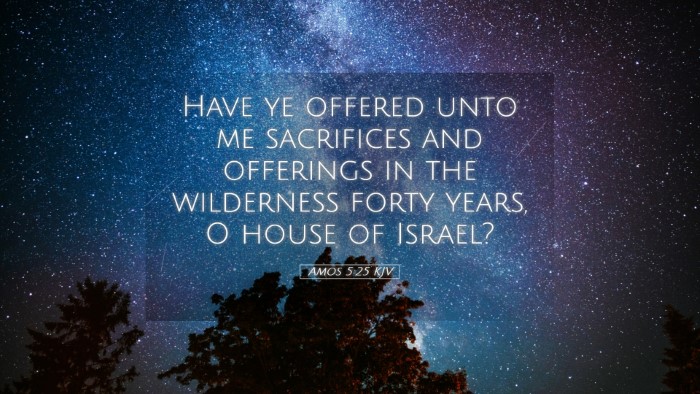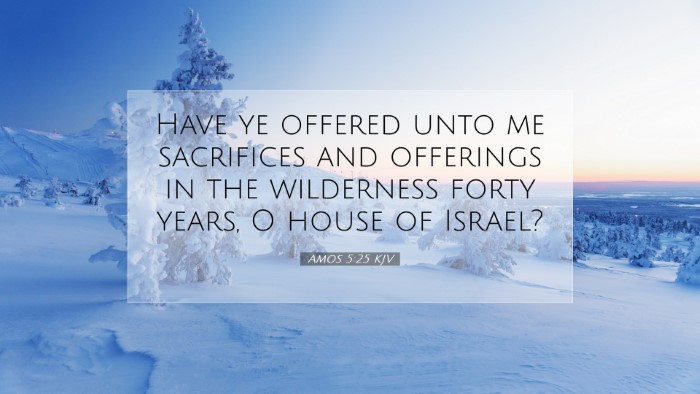Old Testament
Genesis Exodus Leviticus Numbers Deuteronomy Joshua Judges Ruth 1 Samuel 2 Samuel 1 Kings 2 Kings 1 Chronicles 2 Chronicles Ezra Nehemiah Esther Job Psalms Proverbs Ecclesiastes Song of Solomon Isaiah Jeremiah Lamentations Ezekiel Daniel Hosea Joel Amos Obadiah Jonah Micah Nahum Habakkuk Zephaniah Haggai Zechariah MalachiAmos 5:25
Amos 5:25 KJV
Have ye offered unto me sacrifices and offerings in the wilderness forty years, O house of Israel?
Amos 5:25 Bible Commentary
Commentary on Amos 5:25
Verse: "Did you bring me sacrifices and offerings in the wilderness forty years, O house of Israel?" (Amos 5:25, ESV)
Introduction
The book of Amos, authored by the prophet Amos, addresses the moral decay and idolatry in Israel. Throughout this text, Amos calls Israel to repentance, laying bare the hypocrisy of their worship amid social injustice. In Amos 5:25, the prophet questions the sincerity of Israel's worship during their forty years in the wilderness, prompting deeper reflection on the nature of true worship as opposed to mere ritualism.
Contextual Analysis
Historical Background: The Israelites wandered in the wilderness for forty years after their exodus from Egypt, during which time they received the commandments and established their covenant relationship with God. This historical reference anchors the inquiry of Amos regarding Israel's faithfulness to God.
- Moral Decay: By the time of Amos, Israel had become complacent in a state characterized by luxury, oppression, and injustice.
- Religious Hypocrisy: The rituals and sacrifices, rather than being expressions of genuine devotion, became mere formalities devoid of moral obligation.
Commentary Insights
Matthew Henry's Perspective
Matthew Henry underscores the significance of sincere worship versus mechanical rituals. He argues that God did not seek external sacrifices but rather hearts fully devoted to Him. The question posed in Amos 5:25 serves as a challenge to the Israelites' understanding of worship; mere participation in rituals without moral integrity is insufficient.
Albert Barnes' Interpretation
Albert Barnes elaborates on how the Israelites’ sacrifices in the wilderness were commanded by God and were intended to reflect their covenant loyalty. Barnes points out that while sacrifices were a means of approaching God, their efficacy was rooted in the sincerity of the worshipper. The inquiry in Amos implies that God has no interest in rituals divorced from justice and righteousness.
Adam Clarke's Commentary
Adam Clarke elaborates on the significance of this verse in relation to the Israelites’ historical context. He notes that during the wilderness period, gifts offered to God were intended as acts of obedience and gratitude. Clarke warns that the passage serves as an indictment: despite the abundance of sacrifices, Israel maintained a pattern of social injustice and idolatry. This juxtaposition highlights the importance of aligning actions with the ethical expectations set forth by God.
Theological Implications
True Worship: This verse compels a reconceptualization of worship. True worship involves internal transformation rather than mere external compliance.
Calling to Justice: Amos emphasizes that true worship cannot be separated from the pursuit of justice and righteousness within the community. God’s focus is not solely on ritual, but rather on the transformation of hearts and actions in alignment with His character.
Application for Pastors and Theologians
This passage provides critical reflection for leaders within the church. There lies an essential reminder that worship must stem from a heart transformed by God. It encourages pastors and theologians to teach their congregations about the alignment of faith with ethical living and social responsibility.
- Encouragement for Authentic Worship: Pastors are called to cultivate environments where authentic worship occurs—where congregants engage with God not just in song, but through acts of justice and love.
- Teaching on Holistic Faith: Theological education should emphasize that true faith manifests in both personal and communal dimensions of life.
Conclusion
Amos 5:25 serves as a powerful reminder that God desires an authentic relationship with His people characterized by genuine worship rooted in justice and righteousness. The insights gleaned from public domain commentaries emphasize the need for sincerity over ritual and challenge both historical and contemporary believers to examine their worship practices critically. As we reflect upon this verse, may we strive for a faith that embodies both devotion to God and commitment to His ethical standards.


